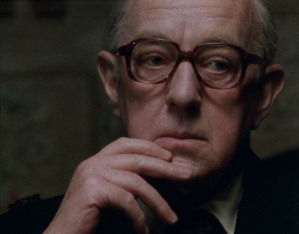"The more identities a man has, the more they express the person they conceal."

There's a pivotal scene in Tinker Tailor Soldier Spy in which Smiley recounts to his accolyte Peter Guillam the story of his attempt in the mid-1950s to convince Soviet spymaster Karla to defect. During the interview, which took place in an Indian prison, the Russian never spoke a word, leaving Smiley to ramble on and on -- an inversion of the interview technique we see an older Smiley using throughout the book, keeping quiet to encourage the subject to talk. Young Smiley convinces himself he can read into Karla's expression, when in fact he is projecting his own sentiments onto the other man. The resulting failure, however, teaches Smiley a lesson.
"I even put it to Control: we should take the opposition's cover stories more seriously, I said. The more identities a man has, the more they express the person they conceal. The fifty-year-old who knocks five years off his age. The married man who calls himself a bachelor; the fatherless man who gives himself two children ... Or the interrogator who projects himself into the life of a man who does not speak. Few men can resist expressing their appetites when they are making a fantasy about themselves."
True enough. John le Carre has a knack for making the particulars of his fictional intelligence world feel like universal expressions of the human condition, and here he hits on something that resonates. The anonymity of the Internet gave everyone the opportunity to craft a cover story, and the fantasies we made about ourselves surely expressed our real appetitites, for better or worse. It's always telling to know what a person would change about himself, what would drive him to concealment or deception. These lies are in fact a form of unwitting self revelation.
What Smiley says is particularly true for authors. Our protagonists can serve as avatars, our plots as a vicarious means of wish fulfillment. When we invent stories, we make a fantasy about ourselves, and its difficult to resist expressing our appetites. Not to bag on Stieg Larsson, but one of the recurring themes in criticism of his work is how closely Mikael Blomkvist resembles his creator, and how ready the author's female creations are to shack up with him. If you're attuned to such things as a reader, you can't help but wince at the thought that the author hasn't covered his tracks well enough. If you're an author yourself, you wonder what secrets you've revealed about yourself as well. Under a similar magnifying glass, would you fare any better?
On the one hand, I agree that making simple biographical interpretations is facile. When people who know me try to connect the mannerisms of Roland March and his circle to me and mine, more often than not they're off the mark. On the other hand, I think Smiley is right. The choices we make when given the power to create an alternate identity are revealing indeed.



